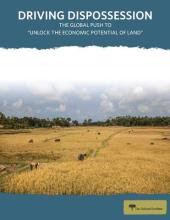Land Library
Welcome to the Land Portal Library. Explore our vast collection of open-access resources (over 74,000) including reports, journal articles, research papers, peer-reviewed publications, legal documents, videos and much more.
/ library resources
Showing items 1 through 9 of 9.The South African Cities Network (SACN) EPWP Reference Group is a peer-based platform, comprising key city officials responsible for implementing the EPWP in their respective cities.
The papers in this volume take a city perspective and provide both a critical reflection of and a pragmatic response to what cities are able to do given their current mandate and powers. The first paper begins by considering what the TOD agenda means for the urban poor.
Over the past six years, the Oakland Institute has been at the forefront of exposing the social, economic, and environmental impacts of foreign land grabs in Ethiopia.
Driving Dispossession: The Global Push to “Unlock the Economic Potential of Land,” sounds the alarm on the unprecedented wave of privatization of natural resources that is underway around the world.
The World Bank in 2010/11 undertook an in-depth review of land governance and land policy in South Africa, with Urban LandMark managing the process and implementing a Land Governance Assessment Framework (LGAF) for South Africa.
South African cities are under the national and international spotlight again. Community protests over service delivery, disputes about councillor selection, mismanagement and underspending of municipal budgets, and recurrent billing problems have attracted growing public concern.
These documents summarise Urban LandMark's approach to incrementally securing tenure in informal settlements. This approach emphasises practical mechanisms that allow land rights to be upgraded over time.
This case study draws on research that sought to understand the process of urban land development in practice, from the perspectives of developers and municipalities.
This case study is based on research undertaken into the experiences of a poor community in accessing land through formal channels in peri-urban South Africa. The research was conducted by a team of researchers pulled together by the World Bank.








